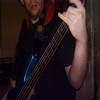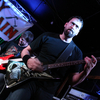GlenJ wrote:OK..SO HOW DO YOU DO IT? A WELL TUNED GUITAR CAN MAKE ALL THE DIFFERENCE. YOU DONT HAVE TO BE A GUITAR TECH TO UNDERSTAND HOW TO DO IT BUT ONCE YOU START TO UNDERSTAND BASICS you might be suprised at how much better you sound when your guit is in tune.
START , Everyone tell me about their korg tuners,,,,I 'll tell you about my tuning fork.
I first learned by intonation. Pick up the A, either from a piano or a fork, then tune off the 12 (octave), and one guitarist I met taught me that the old telephone dial-tone was in fact A-440, so I started using the phone to catch my A string.
On the subject of different players tuning up to their own Korgs or digital tuners, before there was a mass market of tuners, the bass player and rhythm guitar tuned, string by string, to the lead guitarist. And maybe everyone wasnt at 100% pitch to one-another, but that subtle difference is what I think makes a "Live Show" more dynamic as opposed to sterile.
I use my tuner before I go on stage, once there, and after continuous playing, I can hear which string if "off" and I do a quick intonation tuning of that string, I think its un-professional to tune the entire guitar set on stage. Also, if I play a song in E, I work the E strings to pitch as Im playing. If the song is in B, I work the second string to pitch, etc., all the while Im playing. I always try to get young guitar players away from relying on tuners.
I watched Albert King break a string during a song. He got a hold of a new one, still in the package, yanked it out of the envelope with his mouth, pulled the broken string out of the bridge, insert the new one, work it up to pitch......all between singing lyrics and playing fills. He tuned it up just in time for the solo. That there, is my definition of a professional guitar player who KNOWS his instrument.











